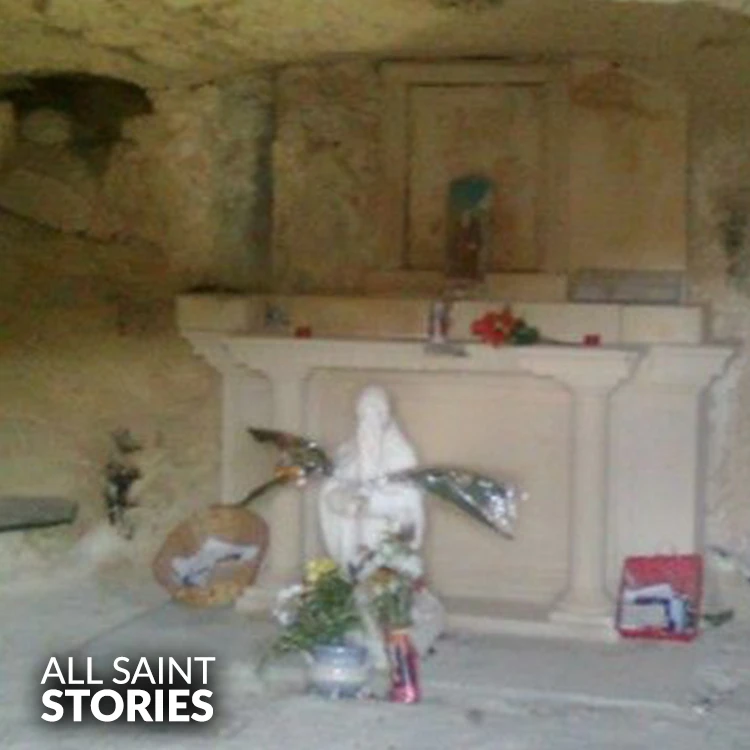"Saint Conrad of Piacenza, faithful servant of God, You devoted your life to prayer and humility. Intercede for us, that we may grow in virtue, And trust in God’s will in all things. Guide us to live with love, compassion, and holiness. Through your example, may we find strength and peace. Amen."
ST. CONRAD OF PIACENZA
ST. CONRAD OF PIACENZA

St. Conrad of Piacenza was an Italian nobleman who abandoned his wealth to live as a hermit in Sicily. After an accident caused widespread destruction, he renounced his possessions in repentance and dedicated himself to prayer, fasting, and charity. He is honored as a patron of penitents and those seeking conversion.
St. Conrad was born around 1290 in Piacenza, Italy, into a noble family. As a young man, he enjoyed a privileged life and was passionate about hunting. However, one event dramatically changed his path.
One day, while hunting, Conrad ordered his servants to set fire to dry brush to drive out game. The fire spread uncontrollably, burning fields, houses, and crops. Authorities arrested an innocent peasant, accusing him of starting the fire. Overcome with guilt, Conrad confessed his responsibility, paid for the damages, and gave away all his wealth as an act of repentance.
Now destitute, he and his wife agreed to separate—she joined a Poor Clare convent, and Conrad became a Third Order Franciscan. He soon withdrew to live as a hermit, spending years in prayer, fasting, and contemplation in Sicily.
Over time, his holiness became widely known, and pilgrims sought his guidance and miracles. Though he desired solitude, he often helped the sick and poor, offering spiritual advice. He spent his final years near Noto, Sicily, where he died in 1351.
After his death, many miracles were reported at his tomb. His relics are enshrined in the Cathedral of Noto, a popular pilgrimage site. Pope Urban VIII canonized him in 1625.
Video Not Found
The information on this website is compiled from various trusted sources. While we aim for accuracy, some details may be incomplete or contain discrepancies.
If you notice any errors or have additional information about this saint, please use the form on the left to share your suggestions. Your input helps us improve and maintain reliable content for everyone.
All submissions are reviewed carefully, and your personal details will remain confidential. Thank you for contributing to the accuracy and value of this resource.
Credits & Acknowledgments
- Anudina Visudhar (Malayalam) – Life of Saints for Everyday
by Msgr. Thomas Moothedan, M.A., D.D. - Saint Companions for Each Day
by A. J. M. Mausolfe & J. K. Mausolfe - US Catholic (Faith in Real Life) – Informational articles
- Wikipedia – General reference content and images
- Anastpaul.com – Saint images and reflections
- Pravachaka Sabdam (Malayalam) – Saint-related content and insights
We sincerely thank these authors and platforms for their valuable contributions. If we have unintentionally missed any attribution, please notify us, and we will make the correction promptly.
If you have any suggestion about ST. CONRAD OF PIACENZA
Your suggestion will help improve the information about this saint. Your details will not be disclosed anywhere.
© 2026 Copyright @ www.allsaintstories.com






 English
English
 Italian
Italian
 French
French
 Spanish
Spanish
 Malayalam
Malayalam
 Russian
Russian
 Korean
Korean
 Sinhala
Sinhala
 Japanese
Japanese
 Arabic
Arabic
 Portuguese
Portuguese
 Bantu
Bantu
 Greek
Greek
 German
German
 Dutch
Dutch
 Filipino
Filipino